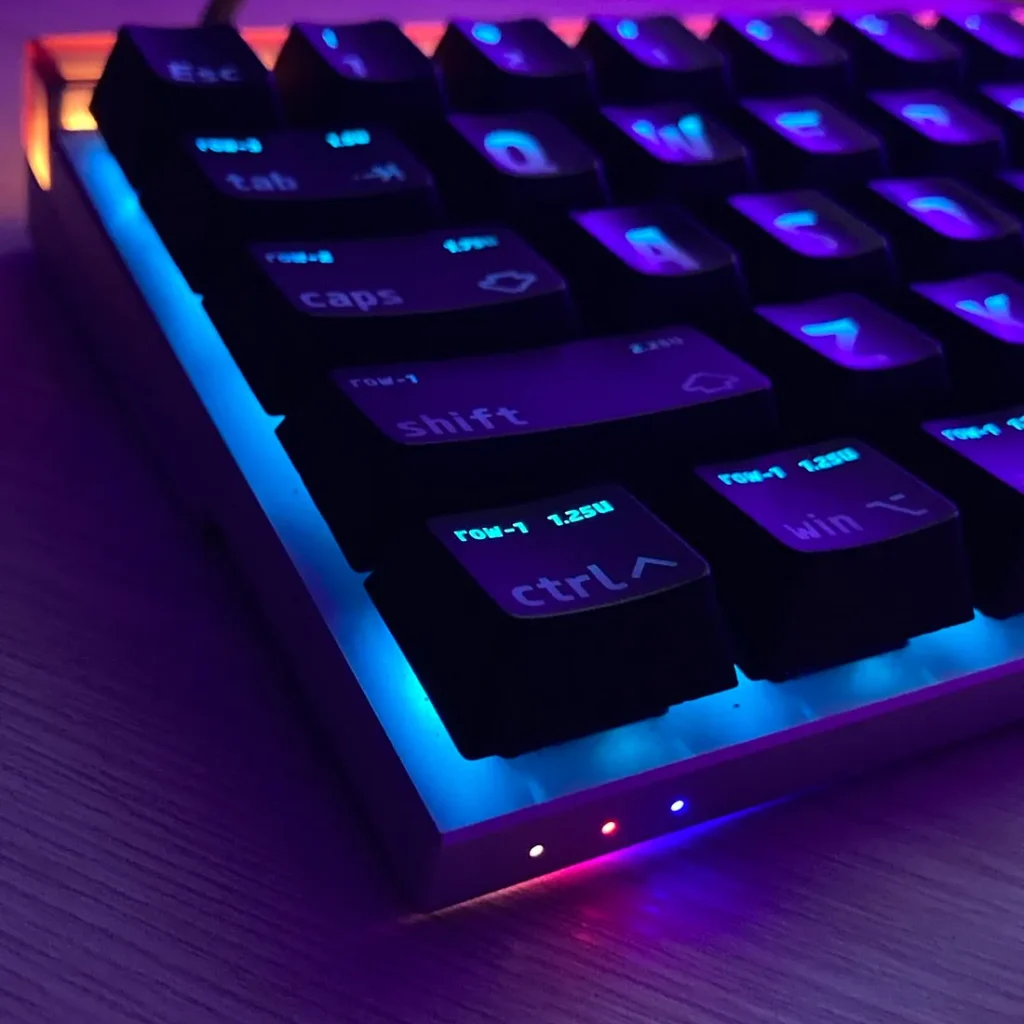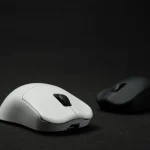Made68Air Review: Low-profile Magnetic Dark Horse
Welcome to our review of the Made68Air, the latest offering from MelGeek that’s set to redefine the compact keyboard market. MelGeek already made waves with the Made68/Pro/Ultra, which earned its stripes among magnetic keyboards for its exceptional TTC KOM switches, robust build quality, impressively low latency, cool aesthetics and user-friendly software. Now, MelGeek has upped the ante by introducing the Made68Air, a sleek, low-profile variation aimed directly at challenging Nuphy’s dominance in the low-profile magnetic keyboard niche. With one standout feature poised to capture your attention, let’s dive into what makes the Made68Air a potential game-changer.
Specs
Rapid Trigger: Yes
Adjustable Actuation: 0.1–2.8 mm
RT Points Sensitivity: 0.01–2mm
Dynamic Keystrokes: 4-in-1 action keys
Compatible System: Mac/Windows/Linux
Mode: Wired
N-key Rollover Support: Yes
Polling Rate: 8000Hz
Scanning Rate: 16000Hz
Latency: 0.125ms
Backlight: 1600w RGB
In the Box
- Made68Air that comes in a plastic sleeve
- keycap puller
- braided USB-A to USB-C cable
- Melgeek Stickers
- Melgeek Welcome Card
- Quick Start Guide
- Warranty Card
- 5 spare keycaps
Melgeek chosed to continue with the “lightbox” design they’re known for. They used frosted PC material, making it not only durable but also less of a fingerprint magnet while giving off this cool, diffused light that’s easy on the eyes.
The build quality screams premium with that CNC anodized aluminium top plate, PBT dye-sub nSA low-profile keycaps, and the ABS+PC bottom housing — it’s like a feast for both your fingers and your eyes. Yet, the black and braided USB-A to USB-C cable should match the overall keyboard aesthetics that is either purple or pink (depending on your choice). That’s something that has been overlooked in my opinion.

Portability? Check. With its 68-key layout and weighing in at just 630g, it’s perfect for taking your setup on the road or keeping your desk clutter-free. The ergonomic design with adjustable feet (6 degrees flat and around 9 degrees with feet on) and a clever trapezoidal back makes it comfy even after hours of use. However, one nitpick of mine that I have to mention: the adjustable feet could just fold when you push the keyboard acrosss your desk, something I witnessed also with NuPhy Air60HE (it was fixed with Air75HE though).
And let’s talk about the dynamic switch — it’s genius. Right at the top, close to the beautiful and customizable Light Bar, you can switch between three modes tailored to what you’re doing: Typing Mode for work, Fast Mode for quick inputs, and Gaming Mode for when you need those pre-set competitive edges. No need to fiddle with settings each time; just switch and you’re good to go. Obviously, you can adjust those profiles in the web-software that is called “Hive”.
Integrated mount (all-in-one mounting plate design) is the way they chose for this one — top cover and the positioning plate are integrated. The whole structure is pretty stiff though (you can even shake the construction and the switches will not loosen), which affects typing feel even though Melgeek used some foam to fill the interior in, (Poron foams + silicone adhesive fillings for both Top and Bottom Case).
Overall, Made68Air looks very fresh, clean and slick, feels great in hand and you can fall in love at first sight, that’s how pretty it is.
Bottom line? High quality with some small drawbacks, very clean and cool look, practical and light.
Switches
TTC KOM Mini are the shortest magnetic switches as of now, only 2.8 mm total travel time. That leads, at least in theory, to quicker responses, ideal for fast-paced games like FPS where every millisecond matters. Shorter key travel and lower actuation force can also minimize finger strain, allowing for longer gaming sessions without discomfort. These are main advantages of low profile keyboards that I’m so glad to see blooming in the magnetic keyboard industry right now.

They are factory lubed, however, they are not the most quiet switches out there — definitely there is some “clack” when you press them.
There are great switches though when you don’t pay too much attention to the sound. They are really stable, the stem wobble is very minimal, almost non-existant. They feel very reliable with their 0.01mm adjustable precision + 0.02mm dead zone at the bottom (not adjustable below that though and that’s good in my opinion). Yet, the TTC KOM Mini are the only option for this now — the switches are designed differently and the hole position on the PCB is also quite unique. I don’t have any info on potential future swappable switches yet.
Bottom line? Shortest magnetic switches as of now, great stability and average sound.
Keycaps
White PBT MelGeek MIA profile keycaps that have a pretty interesting “frosted” design and look are the default keycaps installed onto Made68Air.
They are almost identical to popular nSA profiles.
Bottom line? Good keycaps with interesting design that match the keyboard really well.
Sound Test
As great as TTC Magneto Minis are, there are some shortcomings. The construction of Made68Air is a bit stiff and the sound coming out it the keyboard is a bit clacky— I guess this keyboard could use some better stabs, also some silicon pads here and there would greatly improve the sound experience. Here are two tests:
Bottom line? The sound is average, some modding could improve this.
Latency and Gaming Performance
I’ve been thoroughly impressed with the Melgeek Made68Air, which has become my go-to keyboard for both work and play. Its performance edges out the Wooting 60HE in terms of latency, with an impressive 0.2ms per key press thanks to its 8k polling rate and 16k scanning rate. This low latency is particularly noticeable in fast-paced games where precision and speed are paramount. I’ve tested it on various trick maps, and it has never let me down, delivering smooth and reliable keystrokes. Compared to Nuphy, the Made68Air fits comfortably in the same category, offering similar responsiveness and quality. The software integration has been also good, and the switches have performed exceptionally well, providing a satisfying typing experience. Sound wasn’t an issue for me, as I always play with headphones on, but the overall build quality and responsiveness make this keyboard a strong contender in the low-profile mechanical keyboard market, challenging even the likes of Nuphy.
Bottom line? Great performance, very low latency, top responsiveness.
Software

Melgeek’s web-based software, “Hive,” introduces a unique user interface that sets it apart from the typical sleek designs of other keyboard software, featuring a “small cartoon icon style” that harks back to a more playful era. While this aesthetic might make some features feel a bit unintuitive — for example, I spent considerable time figuring out how to set up Shortcuts/Mod Tap— and it took me way too long and I’m familiar with this stuff. The terminology can be a tad confusing sometimes, there are no options for toggling polling rate or features like Turbo/Tachyon either. However, Hive excels in areas like dead zone configuration, where it’s transparent about the limitation of not going below 0.02 mm. It offers Continuous Rapid Trigger and a functional Auto-Calibration, and even includes Quick Rapid Trigger, a feature akin to DrunkDeer’s innovation, though gamers should be cautious as it might be considered for banning in games like CS due to its counter-strafing capabilities upon releasing a strafe. But then again, this is my explanation to you since there’s nothing mention about what it actually does in the Hive software. That’s something Melgeek should work on — provide a helping hand to those who are newbies in this space.
Tip: unlike Nuphy’s software, Hive gets detected in CS2 and Quake, so beware of being kicked out of the servers.
Bottom line? Pretty good software that needs refinement and be more-user friendly.
Closing Thoughts
In conclusion, the Made68Air magnetic keyboard has proven to be a remarkably satisfying addition to my setup. Its cool, sleek design not only looks great but also adds to its portability, making it an ideal choice for those on the go. The very low latency coupled with the exceptional responsiveness ensures a seamless typing experience, which is further enhanced by the performance of the TTC Magneto switches. While the web-based software still needs a lot of work and refinement (actually, that’s the one and only step you have to take to join the Champions League), the sound profile might not be the highlight of this keyboard, and there are minor shortcomings as discussed earlier, these do not detract from its overall appeal. The Made68Air stands out as a serious competitor to Nuphy’s low-profile keyboards and positions itself as a top contender in the magnetic keyboard market, delivering both style and substance. It’s the performance after all that is outstanding, right? If you are a gamer, Made68Air should be one of the options you should definitely go for.
Bullet Points
- very pretty and slick design
- high build quality
- still one of the first low-profile magnetic keyboards, following Nuphy
- dynamic switch to toggle between profiles
- very portable and practical
- the board is not hot-swappable
- 8k polling and 16k scanning rate
- very low latency (around 0.2ms per single key press) and top responsiveness
- shortest (2.8 mm) sop far, great low profile switches by TTC Magneto
- sound is average and clacky though
- solid web software that still needs work and has bugs
- adjustable feet can fold under pressure
- north-facing RGB is a bit dim
Get the product here and use code “airmanthe” for a discount!
Here are Melgeek’s socia media:
Instagram: @melgeek_official
TikTok: @melgeek_official
YouTube: @melgeek_official
Disclaimer: this review is not a paid endorsement. I want to ensure transparency and let you know that I am not receiving any compensation, monetary or otherwise, for evaluating or discussing this tech product.

















